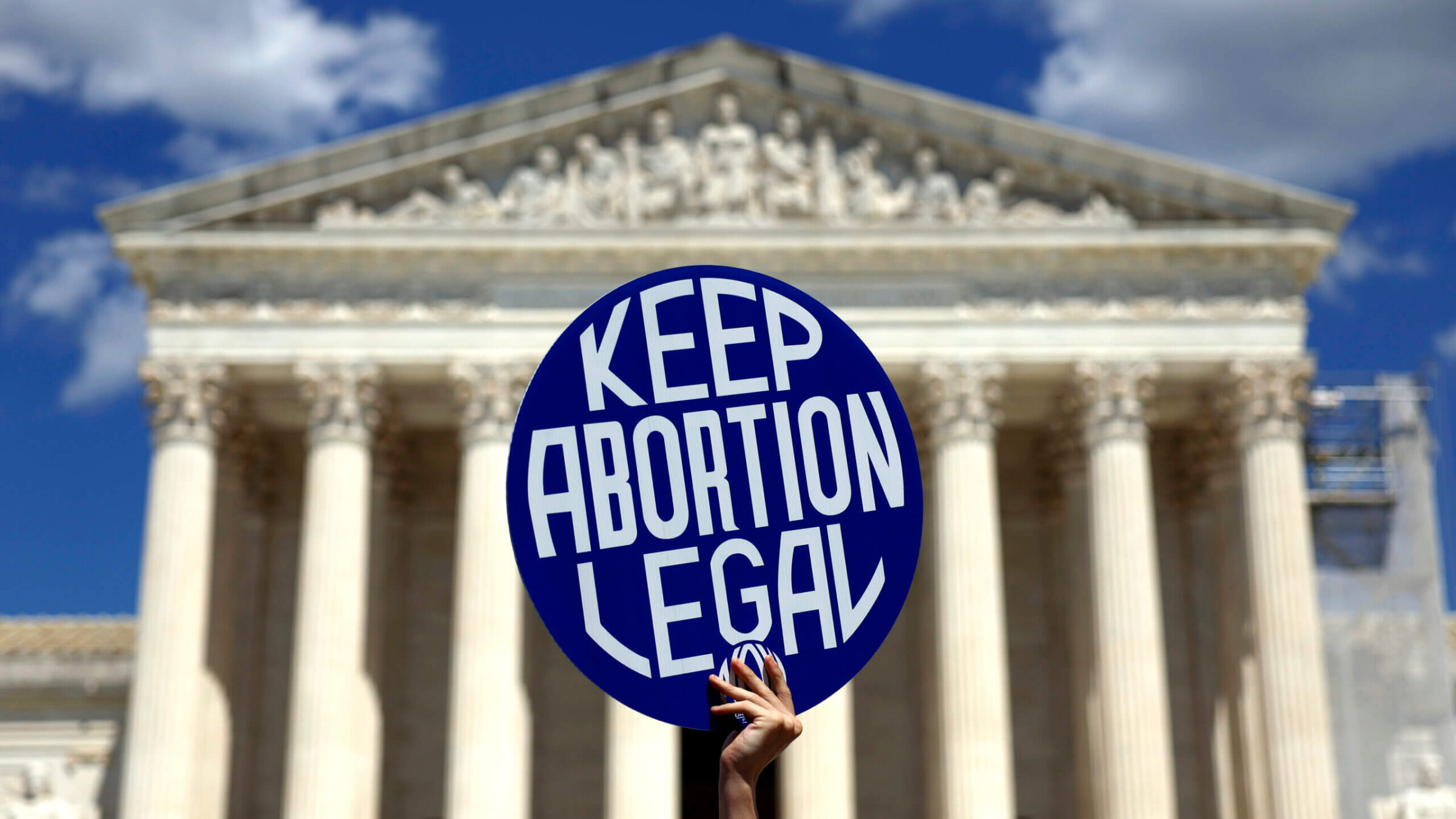I’m turning my rage about women dying from lack of reproductive care into action. You can, too.
The month of Elul is a ripe moment to be called to action with the daily sound of the shofar

An abortion rights advocate participates in a protest outside of the U.S. Supreme Court Building June 24. Photo by Anna Moneymaker/Getty Images
I live in Georgia, where the news broke this week that Amber Nicole Thurman and Candi Miller, two young Black mothers, died as a clear result of our state’s abortion ban. Both of them required a routine medical procedure called dilation and curettage. This procedure is life-saving for those in need of emergency abortion care, but is virtually inaccessible due Georgia’s medically unnecessary abortion ban.
Instead, Thurman languished for 20 hours in an Atlanta hospital, her organs failing, before ultimately dying. Miller didn’t even try coming to the hospital, because she believed that Georgia’s ban would prevent doctors from treating her. The day after the news about Thurman’s avoidable death came out, the Senate once again struck down the Right to IVF Act, which would have safeguarded access to fertility care for all people. The combination of these women’s tragic stories and the repeated loss of fertility care protections in the same week is almost too much to bear.
Thurman and Miller’s deaths are the first “preventable” fatalities due to lack of abortion care post-Dobbs that have been uncovered, but there are undoubtedly many, many more. As one of the first women in America to be ordained as an Orthodox rabbi, I firmly believe that every family has the right to start their family if, when, and how they choose. My advocacy for reproductive freedom is firmly rooted in my rabbinate, and my identity as a proud observant Jew.
We are currently in the month of Elul, the last month of the Jewish year leading up to Rosh Hashanah, and a month known for reflection and repentance. I keep thinking about what else we could have done to prevent the deaths of these women, and there is no better time than Elul to reflect and set ourselves up for a better future of reproductive justice.
The month of Elul brings us daily shofar blasts as we lead up to Rosh Hashanah, a time many of us associate with that sound — a sound that is meant to wake us up and call us to action. These daily blasts are intentional and designed to inspire us to begin the process of teshuvah, repentance and reconciliation. It is innate to the process that as we engage in repentance, we must not only reflect on what we have done, but take active steps to make our world better. The shofar is waking us up to do just that; to bring us out of our stupor and drive us forward.
When the Babylonian Talmud discusses the sounds of the shofar, it describes it as a sound of crying, and connects it to a woman we know about from only three words in the book of Judges: “And the mother of Sisera cried.”
Sisera was the general of an enemy army battling the Israelites, and his mother was waiting for her son to return from battle. She cried out, not knowing whether or not he would return home and with deep sadness about his delay. But Devorah the Prophetess, who knew Sisera had been killed in battle and was involved with his death, ends her song of gratitude to God for winning the battle by including her intuitive recognition of his mother’s cry. Devorah did not know Sisera’s mother personally, and yet she felt that stray mother’s pain and captured it even amidst her own joy. Our Sages saw these words and knew they were expressed in the sound of the shofar, so now, we too remember her cry.
When we hear the cries of Em Sisera (“mother of Sisera” in Hebrew) in the shofar, we hear the cries of unintended consequences and the women who have been forgotten.
Those forgotten women include the 11.3 million who, since Roe v. Wade was overturned, have to travel over an hour to reach the nearest abortion clinic; the 15.4 million reproductive-age women of color live who in states with bans, and the 49 Black women who die per 100,000 live births, because Black people are three to four times more likely than white people to die from pregnancy-related complications. All of these forgotten women and their suffering is preventable.
This is abhorrent and antithetical to our Jewish value of achrayut, or social responsibility, and to pikuach nefesh, the core value by which we believe that life is worth saving above all else.
We must take being called to action by the shofar to a whole new level this year. Every person who has died as a result of restrictive abortion laws, every family whose IVF journey is on the line and every woman who is questioning their access to reproductive healthcare. We must use those cries to propel us into action, and ensure that Christian fundamentalists do not put our collective religious liberties and access to healthcare at risk.
This action includes helping to get out the vote, particularly in states with abortion ballot measures. It is estimated that 16.5 million women could be impacted by abortion ballot measures, nearly 22% of all women of reproductive age in the U.S. Talk to everyone you know about the impacts of abortion bans, and explain that abortion is essential health care. Let them know that access to IVF is on the line, while 42% of American adults have either used fertility treatments themselves, or know someone who has. And most importantly, urge your members of Congress to pass legislation to enshrine a right to abortion in federal law.
After learning the news this week about Thurman and Miller’s deaths and the Senate striking down the Right to IVF Act, I’ve told people I’m “feeling ragey.” Each time I say it, I’m met with nods in-person or heart emojis via text. But I, and we, can’t just sit with this rage. We must use it to spurn action and step forward. In Judaism, we have the concept of “righteous anger,” exemplified by Moshe breaking the tablets after the sin of the Golden Calf. Let us allow our righteous anger over these preventable deaths to inspire us to step forward and act.






















